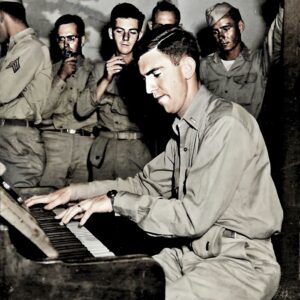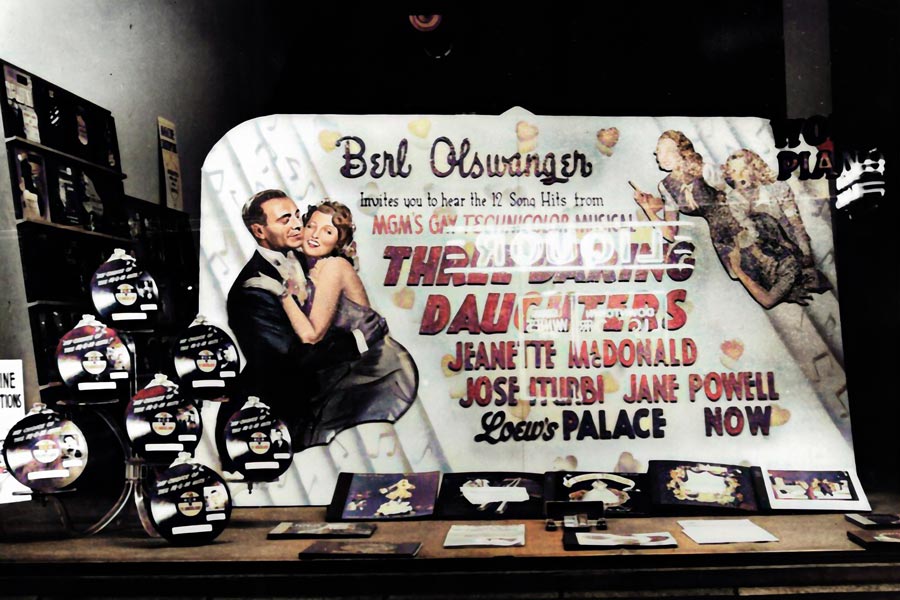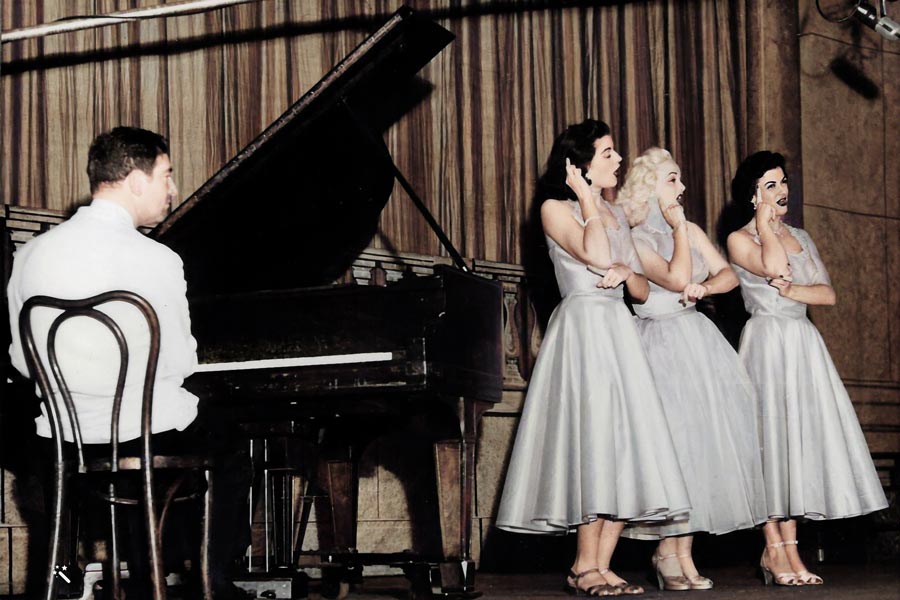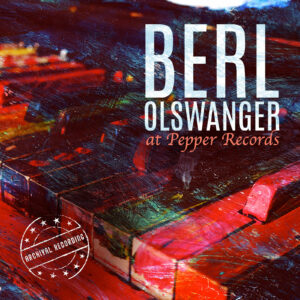Berl Olswanger in the Studio
Berl Olswanger piano and vocals
Art Sutton vocals
Floyd Huddleston vocals
Jimmy Damon vocals
George Sawtelle vocals
Berl Olswanger, “Mr. Music of Memphis,” returns for a fifth installment of timeless archival recordings on Big Round Records with BERL OLSWANGER IN THE STUDIO. This never-before-heard collection transports listeners back to the pianist’s private studio in 1950’s Memphis where he recorded his early compositions, some of which went on to become fully orchestrated tracks on the 2021 release BERL OLSWANGER AT PEPPER RECORDS.
With a smooth blend of blues, country, boogie-woogie, and ragtime influences, Olswanger delivers tunes that capture the popular sounds of the era. From the strong stride piano solo in Chicken Bone Man to the fluttering fills in Tennessee Skidoo, Olswanger’s inimitable approach shines through, inviting listeners into his private studio to witness an early period of the piano great’s legacy.
Listen
Stream/Buy
Choose your platform
Track Listing & Credits
| # | Title | Composer | Performer | |
|---|---|---|---|---|
| 01 | Evergood | Berl Olswanger | Berl Olswanger, piano; Art Sutton and others, vocals | 1:05 |
| 02 | Best Kind of Love | Berl Olswanger, Floyd Huddleston | Berl Olswanger, piano; Floyd Huddleston, vocals | 3:40 |
| 03 | Chicken Bone Man | Berl Olswanger | Berl Olswanger, piano; Art Sutton, vocals | 2:25 |
| 04 | Unspoken Love | Berl Olswanger | Berl Olswanger, piano; Jimmy Damon, vocals | 3:00 |
| 05 | Twelve Chord Boogie | Berl Olswanger | Berl Olswanger, piano; George Sawtelle and others, vocals | 1:40 |
| 06 | Peace of Mind | Berl Olswanger, Floyd Huddleston | Berl Olswanger, piano, other instruments; Floyd Huddleston, vocals | 2:11 |
| 07 | Anna Girl | Berl Olswanger | Berl Olswanger, piano; Art Sutton and others, vocals | 1:11 |
| 08 | Papa, Don't Roll Them Bones | Berl Olswanger | Berl Olswanger, piano, vocals; Art Sutton, vocals | 2:44 |
| 09 | Without Your Love | Berl Olswanger | Berl Olswanger, piano; Jimmy Damon, vocals | 3:19 |
| 10 | Snow Falling | Berl Olswanger, Sue Reid Williams | Berl Olswanger, piano; George Sawtelle and others, vocals | 1:51 |
| 11 | Tennessee Skidoo Instrumental | Berl Olswanger | Berl Olswanger, piano | 1:47 |
| 12 | I'll Spend My Days With Thee | Berl Olswanger | Berl Olswanger, piano; Art Sutton and others, vocals | 2:35 |
| 13 | Rock & Roll For Me | Berl Olswanger | Berl Olswanger, piano; George Sawtelle and others, vocals | 2:43 |
Recorded during the late 1950’s in Memphis TN, in Berl Olswanger’s private studio at Berl Olswanger Music, 1531 Union Avenue
Tracks 1-4 and 6-13 are copyright © 1958 Berl Olswanger, ASCAP, copyright © renewed 1986 Anna Olswanger, ASCAP. Track 5 is copyright © 1956 Berl Olswanger, ASCAP, copyright © renewed 1984 Anna Olswanger, ASCAP.
Digitization and Audio Mastering for Big Round Records Andrew Golden, Olympia Sound Company
Executive Producer Bob Lord
A&R Director Brandon MacNeil
VP of Production Jan Košulič
Audio Director Lucas Paquette
VP, Design & Marketing Brett Picknell
Art Director Ryan Harrison
Design Edward A. Fleming
Publicity Chelsea Kornago
Artist Information

Berl Olswanger
Berl Olswanger, dubbed "Mr. Music of Memphis" by the local press, grew up in Memphis in the 1920s and 1930s where he heard music that would later influence him as a composer. He quickly developed an affinity for the piano and began playing professionally at the age of 12. After a stint on WMC radio in his twenties, he joined the tour of the George Olsen Orchestra, which led him across the country from New York to Hollywood as he accompanied legendary acts like Bing Crosby and Jack Benny.
Notes
The following is from a newspaper article by Thomas Michael that appeared in the July 3, 1960, Memphis Commercial Appeal.
Memphis Music Man
Few men at 42 can look back on 30 successful years in the same business. By the same token, few men who can look back on 30 years in the same business can successfully claim to be 42.
A man who can do both is Berl Olswanger, piano and organ store proprietor, piano soloist, band leader, booking agent, jingle writer, music school head, arranger for vocal groups, song writer, family man, and doer of good works, who this year celebrates his 30th anniversary in the entertainment business.
Berl Olswanger had plenty of chances to go wrong — and it was freely predicted that he would — but he muffed them all. His first job, for instance, was playing the piano with a band at the old Dreamland Gardens across from Central High School. Whatever else could be said of the old Dreamland Gardens — and much could be — it was no place for a cherubic 12-year-old lad to spend his nights.
Many a well-meaning busybody said as much to the boy’s mother, Mrs. I.J. Olswanger, but he came out of this experience the same sterling chap he was when he began it.
Then again at the age of 20, when he was staff pianist at radio station WMC, he had an offer to play with George Olsen’s orchestra, one of the big bands of the big band era in the 30s. His then boss, John Cleghorn, called him in and told him with great feeling and eloquence that traveling with a band could be his ruination.
Mr. Cleghorn cited the wild women and wilder drinking that a young man was apt to encounter living such a life, and even touched in hushed tones on the matter of marijuana smoking and stronger forms of narcotics.
The trouble was that the young Olswanger, instead of being repulsed, was fascinated by Mr. Cleghorn’s lurid tales. “I just had to find out if it was all true,” he recalls.
Accordingly, he signed on with the Olsen band and made his way to, among other places, Hollywood, where he played for, among others, Bing Crosby, Bob Hope and Jack Benny.
All the temptations that Mr. Cleghorn had warned against were present, but the young hero remained unsullied. He doesn’t even smoke filtered cigarettes, let alone reefers. His work with the Olsen band took him to New York City. There he concluded that Memphis was the only place to live, and that, in his own words, “I’d never more roam.”
Next we find the young redhead ensconced as staff pianist for radio station WMPS, playing for numerous parties, and going to Memphis State College. The year was 1940 — an especially memorable year to him because during it he met a Miss Edna Long.
Meeting Miss Long strengthened his resolve to never more roam, but never more roaming went way out of style the very next year. He joined the Navy and roamed until 1946. He began the war years as a torpedo officer on a destroyer and remained one until Admiral ‘Bull’ Halsey heard him play a piano. Thereafter he was an entertainer.
Back home again in 1946, he gave a concert of “middle-brow” music at the Auditorium under the sponsorship of I.L. Myers to a full house. Mr. Myers, ever a man to encourage talent, gave him the receipts and his blessings and saw him off to New York to make good in a big way.
Although well received in the big city, he soon got homesick for Memphis. He came back and opened his store and married his sweetheart, the aforementioned Miss Long.
That was the real beginning of the Berl Olswanger who now celebrates his 30th anniversary in the entertainment business — the superbly talented musician who is a family man and solid citizen.
As noted, Mr. Olswanger is a many-sided man. His best known side — though by no means his most profitable — shows him playing solo piano at cocktail parties, weddings, dinner parties, fashion shows, and the like. His dress and deportment, as well as his music, bear the mark of class.
In the plush surroundings in which he plays, which include the finest homes and most exclusive clubs, he may often look about him and reflect that he has come a long way from his birthplace above a small drygoods store in the section of North Memphis then known as Goat Hill — and from Dreamland Gardens.
“Berl has played for all our parties since he was a child,” one Memphis society matron recently observed to another,” and he could probably make a lot of money by writing his memoirs.”
“He could probably make more by not writing them,” was the answer, but Mr. Olswanger discounts both possibilities.
If a person were musician enough, he could learn a lot about Mr. Olswanger by listening to him play for a fashion show. A model who is a shade too plump for his taste may find herself showing off a fancy gown to the tune of “She’s Too Fat For Me,” but the melody will be so disguised that neither model nor the audience will catch on.
“Flat Foot Floogie” and “Stumbling” are other favorite Olswanger tunes for use in accompanying models. If the model is showing off furs worth thousands of dollars, he is apt to fool around with elegant variations of “The Best Things In Life Are Free” or “Brother Can You Spare A Dime.”
It was stated that Mr. Olswanger, for all his exposure to the temptations generally thought to abound in the world of show business, remained an altogether noble soul. This did not take into account the fact that he writes television and radio jingles. But then nobody is perfect. “The Black & White Stores Are Changing Their Name to Shainberg” is an Olswanger composition, and one that can drive you to the edge of nuttiness if you are susceptible to catch jingles. He has written and arranged many others.
For all the things that he has done over the past 30 years and is now doing, Mr. Olswanger still looks ahead to something else. He got his master’s degree at Memphis State University this summer, and now he would like to get his Ph.D. and teach in a university.
Meanwhile, he does musical missionary work by giving free concerts at schools and civic clubs, showing the relationship of all kinds of classical and popular music. He thinks they all have their place.
This is his musical philosophy:
“I believe strongly that music should not be considered on a vertical scale, with some music rated higher than others, but rather on a horizontal scale. There is a time and place for all kinds of music in our culture. It should be understood by all.
I know that my talent is God-given and I have an obligation to share it with others whether or not for pay. I am sure financial success automatically comes from seriously pursuing a life’s work that one loves without ever thinking about financial remuneration. My income far exceeds what I had anticipated making in Memphis when I decided that I would give up the ‘big time’ to live among the people I love.
I know that talent is the basic 10 percent of ability, but practice is the other 90 percent. I practice daily or must make it up.
I have been accused of being a good businessman because I know the favorite tunes of hundreds of Memphians. This is good business, but it began because I loved to see the light in their eyes when I played their favorite tune when they entered the room.
Again, good business results from first trying to make people happy — and what better way can it be done than with music.”







